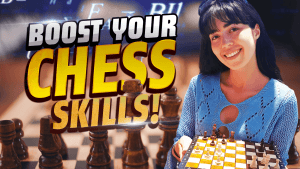
Many club players stay at the same level despite their love for chess and playing a lot of games. This is often due to poor habits, mental blocks, and unfocused effort. Here are common reasons for stagnation and tips to improve, in...

Preparing for a chess tournament with only 15 days requires focus and discipline. Here is the plan:
1. Evaluate Your Current Level
Before diving into preparation:
Analyze Past Games: Review your recent games to identify tactical mistakes, o...

What Is Blumenfeld’s Rule?
First shared by the Soviet master B. Blumenfeld and popularized by authors like Alexander Kotov in Think Like a Grandmaster, the rule advises:
When you have finished your calculations, write down the move you ...

Strengths
Identify what you’re good at and how to leverage it during games:
Strong Tactical Skills: Are you great at spotting tactics and combinations? Focus on sharp openings and middlegames to maximize your strength.
Positiona...

Your chess style is your personal approach to the game. Knowing your style helps you choose openings that suit your strengths and improve your weaknesses.
1. Aggressive and Tactical Players
Overview
Aggressive and tactical players lov...

The knight can be one of the most powerful pieces on the chessboard due to its unusual movement. Typically, it is looking for squares where it won't be chased away by the opponent's pawns, so-called protected squares or outposts.
Understanding t...

It’s been an exciting 7 days at BoltChess! This NEW platform connects chess players with titled players for Training Games! In just 7 days, we’ve seen interesting matches, great new features, and a growing community of chess enthusiast...

Most players start their chess journey with tactics (learning forks, pins, to win material or deliver checkmate) However, many hit a plateau as games become more complex. The next step is to improve positional play by understanding pawn structures...

Are you dreaming of the day you'll finally go head-to-head with a titled chess player? Why wait for a tournament or a stroke of luck? With BoltChess, you don’t have to! Imagine the thrill of challenging Grandmasters, International Ma...

Improving requires targeted strategies depending on your Chess.com rapid rating. Here’s how you can make steady progress:
0-1000: Focus on the BasicsAt this level, mastering the fundamentals is key. - Learn the Rules: Ensure you know ...

Most players (1200-2200 chess.com rating) are strong in tactics and openings, but their ratings don’t show it because their positional knowledge just isn’t up to par. In other words, they can never create the circumstances to exec...

The middlegame is one of the three fundamental parts of every chess game, including the opening and the endgame. Once the initial moves are completed and the players' positions are established, the middlegame begins. Similar to the other parts of ...

If you are an intermediate chess player, the first few moves in a chess game are considered the most crucial moves that most likely predict the middle game quickly as chances of making mistakes get limited. Over the last hundred years, thousands o...

One of the key concepts to master in pawn endgames is the idea of opposition.
What is Opposition?
The opposition, or direct opposition, is a situation where both kings face each other with only one square between them—either on a r...

Most of the players, after finishing their games starts playing another chess game, which is why regardless of playing too many games, it does not improve your tactical and strategical skills quicker. The first step to becoming a better chess play...

As an intermediate chess player, you may have already mastered the basics of tactics and have a good understanding of chess openings. However, there is always room for improvement and further development of your chess skills. This study plan is de...

It can be frustrating to feel stuck at your current skill level, but don't worry – there are steps you can take to overcome this plateau and continue improving. Here are some tips for what to do when you're stuck in a certain chess level:
...

As an intermediate chess player, you may have already mastered the basics of tactics and have a good understanding of chess openings. However, there is always room for improvement and further development of your chess skills. This study plan is de...

Choosing the right chess opening for your playing style can be challenging, as there are many options available. This article discusses two common chess styles: tactical and positional.
First, let's take a look at the different chess styles: tac...

Generally speaking, every focal-point is a weak square in the defender’s territory and a potentially strong one for the attacker.’ This is especially so when such a point is adjacent to the opponent’s king. A focal point is a squ...

Chess is more than just a game - it is a mental exercise that can have numerous benefits for those who study and play it. From strategic thinking and problem-solving skills to patience and discipline, creativity and focus, chess can help players d...

In the chess study plan I present below, I will show you 5 things you can do that will help you improve your chess.
1. Play often and enjoy it!
To improve your chess, you should regularly play against stronger opponents. Playing against weaker...

Tired of tactics? Why not try out our positional puzzles! Depending on the level of each exercise (they are presented in ascending order of difficulty) you will probably need between 5 and 20 minutes to find the solution. If your solution doesn't ...

They say “Pawns are the soul of chess” because they play a significant role from chess opening to the end game. Even losing a single pawn can give your opponent a big material advantage and blunder the entire game. This article is all ...

Most chess players do not know the link between in-game strategy and tactic, and many chess beginners get tangled easily. According to experienced chess players, when a player plans to make strategies during a chess game, it leads to tactical mane...

























